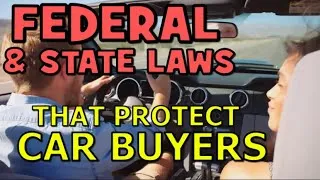FEDERAL AND STATE LAWS PROTECTING CAR BUYERS

Federal and State Laws that can protect Car Buyers from Bad Car Dealers
Friends, if you’re in the market for a car or just curious about the laws that protect car buyers, you’ve come to the right place. In this report, we’re diving into the world of the legal framework that governs the activities of car dealerships.
Today’s report is written up by Kevin Hunter, The Homework Guy and the always Amazing Elizabeth.
Whether you’re buying a new or used car, understanding your rights as a consumer is essential to defending yourself. The knowledge in this report is definitely a part of my Elizabeth’s secret sauce to being a great negotiator, and here we break it all down from complex legal jargon into plain everyday language. This is the stuff that levels the playing field!
As you’re reading today, if you find this content helpful, don’t forget to join us on our weekly broadcasts on YouTube and subscribe so you don’t miss out on upcoming shows.
When it comes to buying a car, both state and federal laws provide protections for car buyers to ensure fair and transparent transactions. It’s stuff you need to know! Let’s get started!
First, here are some of the Federal Laws that are very impactful:
- The Truth in Lending Act (known as TILA): This law requires dealers to provide clear and accurate information about financing terms, including the annual percentage rate (otherwise known as APR) and total loan costs. TILA is a federal law that is designed to protect consumers, and it requires dealers to provide transparency and accuracy in lending transactions. While TILA primarily applies to various types of credit transactions, including loans and credit cards, it also has implications for car buyers who finance their purchases. Here in part is how TILA protects car buyers: It requires 1. Disclosure of Loan Terms, which allows car buyers to understand the true cost of the loan. 2. Right of Rescission, which doesn’t apply to car loans. 3. Provides Interest Rate Caps, which creates a limit on how much interest you can be charged, 4. Requires Uniform Loan Terminology, so the writing in your loan isn’t confusing, and 5. Gives a Right to Receive a Written Notice of Denial, so if you are declined for a loan, you’ll know why.
- Friends, if you need TILA protections because you’re sitting in a dealership trying to get financing, you’re doing it all wrong. Get a pre-approval from your own bank or credit union first. Do not turn yourself over like a clueless guinea pig to a dealer finance officer!
- Then there’s The all important Consumer Leasing Act: This federal law is key to anyone with a car lease because it requires dealers to provide clear and complete information about lease terms, including monthly payments, fees, and penalties. It also mandates the disclosure of key lease details, including ALL lease buyout fees. This law is incredibly key to know for anyone who currently has a leased car and wants to buy it out, because it legally prohibits dealers from charging you ANY FEES not clearly stated in your lease documents. The truth is that nearly 100% of the time when ANY consumer is paying dealer fees on a lease buyout, the dealer is violating The Consumer Leasing Act by charging a previously undisclosed fee. You must bust their chops for this!
- Next is the The Magnuson-Moss Warranty Act: This law regulates warranties on consumer products, including cars. It ensures that dealers honor warranty commitments and provides legal remedies for consumers if warranty obligations are not met. Very important to understand this law if a dealer refuses to do work covered by warranty on your car. Fulfilling the obligations of a warranty is NOT optional!
- Dodd-Frank Act of 2010 & CFPB. This is the law you’ve all been asking for more details on! Under Section 14-14 of the Dodd-Frank Act passed into law in 2010. Here’s how it works: Dodd-Frank Wall Street Reform and Consumer Protection Act restricts prepayment penalties on car loans over 61 months, specifically through federal regulations enacted by the (CFPB) Consumer Financial Protection Bureau. So there you have it!
- KEV: Next is Tied Selling: Tied Selling addresses the nonsense of forced add-ons where a dealer tells you that you must buy things they added to the car whether you want them or not. It’s not legal! This issue is addressed by two federal departments of the US government: The Federal Trade Commission the (FTC) and the U.S. Department of Justice, the (DOJ). Forced Dealer Add-ons are not legal, friends!
State Laws to be aware of: (always research your specific state laws and regulations.
State laws can vary significantly, so it’s important to familiarize yourself with the specific laws in your state. That’s something I always do before car shopping in any given area. I’m never sitting in a dealership without having thoroughly researched the relevant state laws. It’s definitely one of Ekizabeth’s power negotiating moves!
However, as a heads up for our readers and viewers, there are several areas of state level legal protection that Liz researches and are commonly covered by state laws. They include:
- Lemon Laws: Important to know that Lemon Laws are state specific. Most states have lemon laws that protect buyers from purchasing defective vehicles. These laws provide remedies if a car has significant defects that the dealer cannot repair within a reasonable number of attempts. But documentation means everything when filing a lemon law complaint, so keep records of everything you do or have done on your vehicle.
- Used Car Warranty Laws: Some states require dealers to provide warranties on used cars, particularly for vehicles sold with low mileage. These warranties typically cover certain defects or malfunctions for a specific period after purchase. Where legally required, the warranty must be clearly stated on the window.
- Disclosure Requirements: States may also have specific requirements for dealers to disclose information about a car’s history, including previous accidents, title status, and mileage. These requirements are designed to prevent fraudulent practices and misleading statements about a car’s history to a buyer. Many dealers provide a free history report on their vehicles even when state law does not mandate it, so remember to ask for that.
- Unfair and Deceptive Trade Practices Acts: Many states have laws that prohibit unfair and deceptive practices by car dealers. These laws protect consumers from practices such as false advertising, misrepresentation, and deceptive sales tactics. There are many examples of how dealer engage in this kind of activity:
- Bait and Switch: The dealership advertises a specific car model at an attractive price to lure customers into the showroom. However, upon arrival, they claim the advertised car is no longer available and pressure the customer into buying a more expensive alternative.
- Hidden Fees: This is also deceptive advertising. Dealerships advertise cars at a certain price but fail to disclose additional fees, such as “dealer fees,” “document fees,” or “destination charges,” until the buyer is already in the negotiation process. This violates most state level Unfair and Deceptive Trade Practice laws
- Misleading Discounts: Dealers put large discounts or savings in advertisements on a car’s price but fail to disclose that these discounts are conditional upon meeting specific criteria, such as financing through the dealership at a high-interest rate.
- Requiring Specific Documentation: Some state laws may mandate specific documents that must be provided to buyers during a car purchase, including a bill of sale, odometer disclosure statement, and emissions inspection certificate.
- Mandated Arbitration and Mediation: Some states have programs that offer arbitration or mediation services to resolve disputes between buyers and dealers without the necessity of going to court.
It’s crucial to research the laws and regulations specific to your state and become familiar with your rights as a car buyer. As we said earlier, one of the reasons Elizabeth is regarded by some people as a savage negotiator comes directly from her personal interest and the time she invests in understanding the law.
Always do yourself the favor of slowing things down in finance by thoroughly reviewing all contracts and documents provided by the dealer.
Always have an independent mechanic inspect a used car before finalizing the purchase. Btw, If you encounter problems or believe your rights have been violated, you can also consult with a legal professional who specializes in consumer protection or automotive law. That’s what you want to look for: A Consumer Protection Attorney. Hopefully you’re lucky enough to find someone like our good friend, Attorney Dan Whitney in Maryland! Here’s his website: https://whitneyfirm.com/ Visit Whitney Law Firm today!
